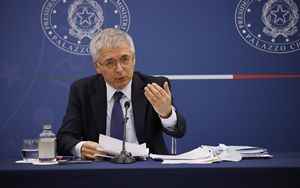(Finance) – “We had an extremely long period of extremely low rates, years ago no one would have expected them negative for so long. The fact that they now rise in the world, to more normal levels, is fully awaited. The question, here, it is the trajectory of this increase, the timing of the increases, and the fact that these increases must occur without tension, without shock. ” This is what the Minister of Economy, Daniele Franco, in the closing press conference of interministerial meetings of the OECD, co-chaired by Italy in Paris, commenting on the ECB’s decision to raise rates.
“In fixing interest rate increases, – found Franco – one must consider the factors underlying inflation. Whether it is more related to supply or demand. If inflation is linked to demand, the increases in rates are more appropriate to contain it. When it depends largely on supply-side shocks, then the rate hikes are less relevant. So I would say that the hikes by themselves do not affect the macroeconomic scenario much. We have to bear in mind that inflation, which it was zero, it is moving up, that underlying inflation is also going up. So what we should avoiding is introducing unnecessary tension. And central banks should try to select trajectories that take into account the factors underlying the increases in inflation “
Franco also explained how at the OECD meetings of these two days the ministers “underlined the relevant economic effects due to the warespecially exacerbating inflation, which have contributed to a significant slowdown in growth and worsening problems in supply chains “. The Minister of Economy announced that the need was agreed to” support the most vulnerable phases of populations and the most in difficulty”.
Another important theme – Franco highlighted – “was that of problems with food supplies, which threaten economic well-being “. According to the minister,” a food crisis must absolutely be prevented. Starting from the ports, a Ukraine: we must – he said – unlock the millions of tons of still food “.
